
Programmed by Scott Miller Berry, re:assemblage collective, Toronto
Program presented with support from the Ontario Arts Council’s Touring Program, an agency of the Government of Ontario.
.
- Total Running Time: 64 minutes
.
“But I never said I would stay to the end
I knew I would leave you and fame isn’t everything
Screaming like this in the hope of sincerity
Screaming it’s over and over and over
I leave you with photographs, pictures of trickery
Stains on the carpet and stains on the memory
Songs about happiness murmured in dreams
When we both of us knew how the end always isHow the end always is…” — The Cure, “Disintegration” (1989)
.
The nine short films in this program each explore notions of loss through profound personal explorations of personal and/or political disintegration. Each short is a personal diary unto itself, delving into his/herstories in profoundly emotional ways; wherein the form is only assisted through tactility: whether hand-processed celluloid, archival video footage, in camera creation, VHS tapes, standard-definition recording or processing films with plant life.If the film strip or video screen is flat, does film have depth? Is such depth in regards to colour grading or to the form or the content? I would argue projected film or video does have depth, but what does that look like in a ‘flat’ presentation or reception format? In each of the nine films in Unless You’re Living It: Dis/Integration, emotional depth is beautifully explored through hands-on approaches that bring the viewers body and mind into the screen and beyond. Christine Negus’s videos anchor the program with three personal explorations of loss, extinction and exaltation.
Malena Szlam’s film Lunar Almanac takes us to the sky for a single frame ecstatic dance of light play and reflection. Cecilia Araneda’s video essay The Space Shuttle Challenger reflects on the impact of barbarous historical events on a young refugee. Alexandra Gelis’s The Island is a small-gauge hand-made portrait of a gardener who continues to resist, survive and thrive. Sarah Bliss’s Unless You’re Living It is a verité portrait of small-town Mount Forest, Ontario told through intimate photography and interviews with its residents via hand-processed 16mm film and painted colour. Franci Duran’s It Matters What is a multilayered juxtaposition of human, animal and plant lives and the power of plant life in the photographic process as filtered through theorist Donna Haraway. Sharlene Bamboat’s Video Home System is a dynamic video essay that contrasts popular culture, political nationalism and the underground film economies in Pakistan of the 1980’s and 1990’s.
.
.
.
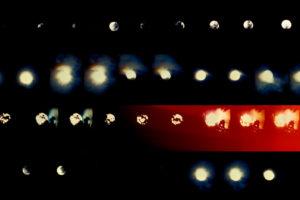
Lunar Almanac (2013)
4 min / 16mm / silent
Malena Szlam, Quebac, Canada
“Lunar Almanac traces the observational points of the lunar cycle in a series of visual notations. Using single-frame and long-exposure photography, the unaltered, in-camera editing accumulates over 4,000 layered field views of half-moons, new moons, and full moons. These lunar inscriptions flit across the screen with a frenetic energy, illuminating nocturnal reveries that pull at the tides as much as our dreams.”
Malena Szlam (b. Chile, lives in Montreal) is an artist-filmmaker working at the intersection of cinema, installation and performance. Her practice explores the relationship between the natural world, perception, and intuitive process. Her work has been exhibited in festivals and museums including the Toronto International Film Festival, International Film Festival Rotterdam, Viennale, Hong Kong Film Festival, New York Film Festival, Museum of Fine Arts Boston, Buenos Aires Museum of Modern Art and the Louisiana Museum of Modern Art.
.
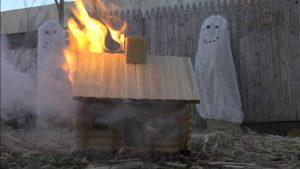
Our Home (2013)
3 min / sound (English)
Christine Negus, Ontario, Canada
“A miniature model of a cabin is set aflame while a droning version of Loretta Lynn’s “This Haunted House” rings out and two ghoulish tree protectors stare on.”
Christine Negus is a multidisciplinary artist who received the NFB’s Best Emerging Canadian Video/Filmmaker award at the Images Festival in 2008. Negus obtained her MFA from Northwestern University in 2010 and her BFA from Western University in 2008. Some of her notable exhibitions include: the8fest, CROSSROADS, MIX NYC, Dunlop Gallery, Queer City Cinema, AKA artist-run, Artists’ Television Access, Milwaukee Underground Film Festival, Museum London, Media City Film Festival, Art Gallery of York University, Swedish Film Institute, and Kasseler Dokfest.
.
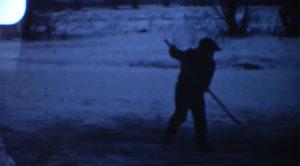
The Space Shuttle Challenger (2017)
9:45 min/ black & white & color / sound (English & Spanish)
Cecilia Araneda, Manitoba, Canada
“Through found footage, The Space Shuttle Challenger entwines the Challenger disaster, Guantanamo Bay, Chile’s coup d’état and experiences of being 16. It reflects on the personal impact of large events in world history and small moments of hope that survive.”
Chilean-Canadian filmmaker Cecilia Araneda came to Canada as a child as a refugee with her family after they escaped Chile’s military dictatorship. She has completed 15 short films to-date,which have been presented at film festivals, artist run centres and art museums around the world including Visions du Reél, Ann Arbor, Jihlava IDFF, the Images Festival and Festival du Nouveau Cinéma. Solo surveys of her work have been presented in Buenos Aires, Ottawa, Toronto and Winnipeg.
.
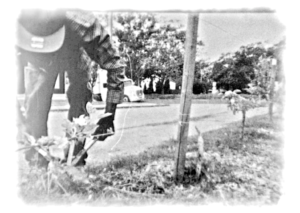
The Island (2019)
6 min/ super 8 mm on video/ black & white/ sound (English)
Alexandra Gelis, Ontario, Canada
“A garden between Oakland and Berkeley, California, USA where residents of the neighborhood plant tributes to their loved ones via fruit plants and flowers. Spaces of love and freedom are cared for by Brian for the last 25 years. The island resists, like the living legacy of the Black Panthers today. Made in Super 8mm, processed by hand and re-scanned multiple times until it achieving a deterioration effect worthy of the image.”
Alexandra Gelis is a Colombian-Venezuelan artist living and working in Toronto, Ontario. Her studio practice combines new media, installation, and photography with custom built interactive electronics. Her projects incorporate personal field research as a tool to investigate the ecologies of various landscapes through examining the traces left by various socio-political interventions. She has exhibited internationally in North and South America, Europe and Ethiopia.
.
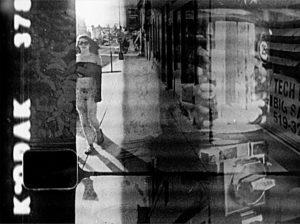
Unless You’re Living It (2019)
8 min/ 16 mm on video/ black & white/ hand painted color/ sound (English)
Sarah Bliss, Ontario, Canada
“An edgy, unsettling portrait of place and power in rural white Ontario that challenges the correlation between seeing and knowing and the ravages of late-stage capitalism. Hand processing, contact printing, tinting and toning engage the film as a body that, like the residents of Mount Forest, sustains injuries, wounds and burdens, but also has the capacity for delight, revelatory pleasure, and transformation. With special thanks to Phil Hoffman and the 2016 Independent Imaging Retreat (“Film Farm”), where Unless You’re Living It was shot and hand-processed.”
Sarah Bliss is a white, owning-class filmmaker, artist and educator of Northern European descent whose work facilitates deep encounter with the sensate, desiring body. Engaging personal and social history, she works artisanally with hand-processed film and video to create experimental and documentary projects and immersive installations. Her work has screened at festivals + museums including Edinburgh International Film Festival; Museum of Contemporary Art, Taipei; Fracto Film Encounter; Transient Visions and Anthology Film Archives. She teaches cameraless filmmaking and is a member of Boston’s AgX Film Collective.
.
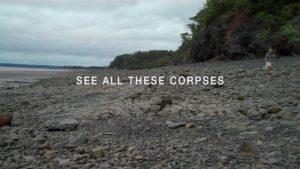
FROZEN GIANTS (2014)
4 min/ color/ sound (English)
Christine Negus, Ontario, Canada
“FROZEN GIANTS realizes the traumatic truths going on (in the Disney song) “Under The Sea.” Shot on a Nova Scotia beach that is tormented with fossils, the narrator suggests – “the sea is a haunted house” as she uses the rocks she finds to discuss loss and death.”
Christine Negus is a multidisciplinary artist who received the NFB’s Best Emerging Canadian Video/Filmmaker award at the Images Festival in 2008. Negus obtained her MFA from Northwestern University in 2010 and her BFA from Western University in 2008. Some of her notable exhibitions include: the8fest, CROSSROADS, MIX NYC, Dunlop Gallery, Queer City Cinema, AKA artist-run, Artists’ Television Access, Milwaukee Underground Film Festival, Museum London, Media City Film Festival, Art Gallery of York University, Swedish Film Institute, and Kasseler Dokfest.
.
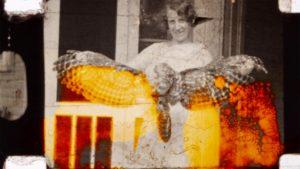
It Matters What (2019)
9 min/ 16mm film/ video/ colour/ black & white/ sound (English)
Francisca Duran, Ontario, Canada
“Absences and translations motivate this experimental animation in an exploration of the methods and materials of reproduction and inscription. A fragment from Donna Haraway’s essay Tentacular Thinking is reworked here as a poetic manifesto. Enigmatic found-footage calls into question human violence over animal species. Plant life is both the subject matter of the images and assists the means of photographic reproduction. Techniques used include in-camera animation, contact-prints and phytograms created by the exposure of 16mm film overlaid with plant material and dried for hours in direct sunlight.”
Francisca Duran is a Canadian experimental media artist based in Toronto, Canada. Born in Santiago, Chile, Duran came to Canada as a refugee following the 1973 military coup. Duran has exhibited nationally and internationally including HotDocs, DOK Leipzig, the Images Festival, Ann Arbor Film Festival, Arkipel Jakarta International Documentary + Experimental Film Festival, Rotterdam International Film Festival, the John Hansard Gallery and Gallery 44.
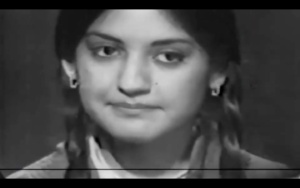
Video Home System (2018)
19 min/ colour/ black & white/ sound (English & Urdu)
Sharlene Bamboat, Ontario, Canada
“Video Home System traces the convergence of popular culture and politics in Pakistan during the 1980s and 1990s. This video showcases connections between pop culture and nationalism and how bootleg economies kept the cinema industry alive during periods of censorship.”
Sharlene Bamboat (b. 1984, Pakistan) is a video and installation artist. Her work is anchored in the absurd and mundane retracing of history through queer aesthetics and popular culture. Her works have exhibited internationally including: the Sharjah Film Platform, Berlin Film Festival, Aga Khan Museum, London Film Festival (UK), Malmo Queer Film Festival and Vasakh Film Festival. In addition to her artistic practice Sharlene contributes regularly to the arts sector in Canada as a programmer, jury member and Board member. She is currently the Director of Operations for Toronto Queer Film Festival. Bamboat lives and works between Toronto and Montreal.

better than awful (but still pretty shitty) (2016)
2 min/ colour/ sound (English)
Christine Negus, Ontario, Canada
“better than awful (but still pretty shitty) provides an absurd proposal to cope with trauma. As the narrator makes (futile) suggestions at superficial solace, the work inadvertently and unabashedly laughs in the face of pain and suffering.”
Christine Negus is a multidisciplinary artist who received the NFB’s Best Emerging Canadian Video/Filmmaker award at the Images Festival in 2008. Negus obtained her MFA from Northwestern University in 2010 and her BFA from Western University in 2008. Some of her notable exhibitions include: the8fest, CROSSROADS, MIX NYC, Dunlop Gallery, Queer City Cinema, AKA artist-run, Artists’ Television Access, Milwaukee Underground Film Festival, Museum London, Media City Film Festival, Art Gallery of York University, Swedish Film Institute, and Kasseler Dokfest.
Biography:
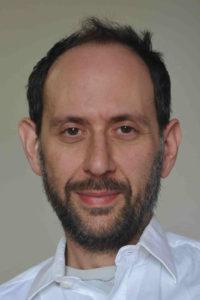
Scott Miller Berry is a filmmaker and cultural worker living in Toronto, Canada. He is Managing Director at Workman Arts, an arts + mental health organization and co-organizer of the re:assemblage screening collective. Previously he was Executive Director at the Images Festival. Recipient of the Rita Davies / Margo Bindhardt Award for cultural service, he sits on the Board of Directors of TMAC, Toronto Media Arts Centre. Most of his films are shot on 16mm and/or Super 8 film and address themes of mortality, grief, memory and collective histories and are often processed by hand. His film ars memorativa screened in competition at Oberhausen after debuting at Experimenta India in Bangalore. Recent screenings include Jakarta, Ottawa, Lisbon, Montréal, Seoul, Vienna, Regina and a fall 2015 retrospective with Colectivo Toronto.
